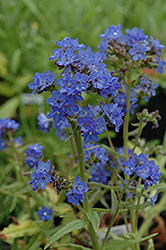Blue Angel Summer Forget-Me-Not
Anchusa capensis 'Blue Angel'
Plant Height: 12 inches
Flower Height: 18 inches
Spread: 24 inches
Sunlight:
![]()
Hardiness Zone: 5
Other Names: Cape Forget-Me-Not
Description:
Brilliant clusters of blue forget-me-not flowers will brighten any space, blooming over a long period; team up with other annuals and perennials for eye-popping combinations
Ornamental Features
Blue Angel Summer Forget-Me-Not features showy clusters of blue flowers from late spring to early fall. Its small narrow leaves remain green in color throughout the season.
Landscape Attributes
Blue Angel Summer Forget-Me-Not is an herbaceous perennial with a ground-hugging habit of growth. Its relatively fine texture sets it apart from other garden plants with less refined foliage.
This is a relatively low maintenance plant, and should be cut back in late fall in preparation for winter. It is a good choice for attracting birds, bees and butterflies to your yard, but is not particularly attractive to deer who tend to leave it alone in favor of tastier treats. It has no significant negative characteristics.
Blue Angel Summer Forget-Me-Not is recommended for the following landscape applications;
- Mass Planting
- Rock/Alpine Gardens
- Border Edging
- General Garden Use
- Groundcover
Planting & Growing
Blue Angel Summer Forget-Me-Not will grow to be about 12 inches tall at maturity extending to 18 inches tall with the flowers, with a spread of 24 inches. Its foliage tends to remain dense right to the ground, not requiring facer plants in front. It grows at a medium rate, and under ideal conditions can be expected to live for approximately 10 years. As an herbaceous perennial, this plant will usually die back to the crown each winter, and will regrow from the base each spring. Be careful not to disturb the crown in late winter when it may not be readily seen!
This plant should only be grown in full sunlight. It is very adaptable to both dry and moist growing conditions, but will not tolerate any standing water. It is considered to be drought-tolerant, and thus makes an ideal choice for a low-water garden or xeriscape application. It is not particular as to soil type or pH. It is somewhat tolerant of urban pollution. This is a selected variety of a species not originally from North America. It can be propagated by cuttings; however, as a cultivated variety, be aware that it may be subject to certain restrictions or prohibitions on propagation.
